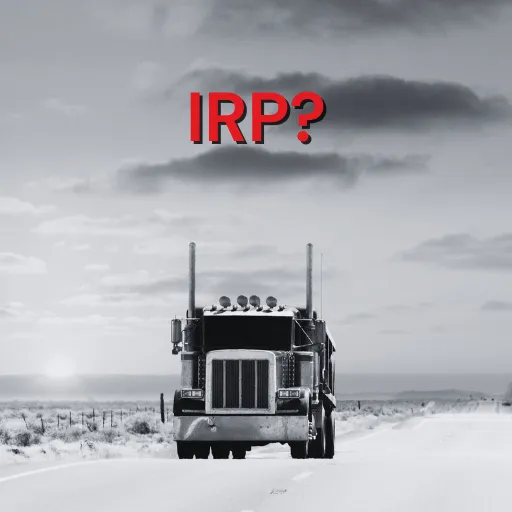| FREE Consult!
Read Our Latest Blog
These Blog Posts are to cover some of the most relevant topics, questions, and issues we see that is relevant to truckers and companies, regardless of size and load.

Understanding IRP
IRP Registration: Your Complete Guide to Interstate Authority
The International Registration Plan (IRP) serves as a crucial component of interstate trucking operations. Understanding and properly managing your IRP registration can mean the difference between smooth operations and costly delays. This comprehensive guide will help you navigate the registration process effectively.
Understanding IRP Fundamentals
The International Registration Plan allows commercial vehicles to operate in multiple jurisdictions under a single registration. Rather than requiring separate registrations for each state or province, IRP enables carriers to register once in their base jurisdiction and receive apportioned registration fees based on the percentage of miles traveled in each member jurisdiction.
Determining IRP Requirements
Your operation requires IRP registration if you operate qualified vehicles in two or more member jurisdictions. Qualified vehicles include:
Commercial vehicles with a gross vehicle weight exceeding 26,000 pounds Commercial vehicles with three or more axles regardless of weight Combinations of vehicles with a gross combined weight exceeding 26,000 pounds
The Registration Process Explained
Securing and maintaining proper IRP registration involves several critical steps and considerations. Understanding this process helps ensure successful registration and ongoing compliance.
Initial Registration Requirements
When first registering under IRP, you must provide comprehensive documentation including:
Your established place of business or residence in the base jurisdiction Proof of liability insurance meeting each jurisdiction's requirements USDOT number and active operating authority Projected mileage for all jurisdictions where you plan to operate Vehicle documentation including titles, leases, and purchase agreements Federal Heavy Vehicle Use Tax (Form 2290) proof of payment
Calculating Registration Costs
IRP registration fees depend on several factors:
The percentage of miles traveled in each jurisdiction Vehicle weight and configuration Type of operation Number of axles Age of equipment
Understanding these factors helps you accurately project costs and maintain appropriate cash flow for your operation.
Managing Ongoing Compliance
Successfully maintaining IRP compliance requires attention to detail and proper management throughout the year.
Record-Keeping Requirements
Maintain detailed records of:
Actual distance traveled in each jurisdiction Trip permits purchased Individual vehicle movements Supporting documentation for all miles claimed Equipment additions or deletions from your fleet
These records must be preserved for five years from the close of the registration year.
Fleet Management Considerations
Effective IRP management requires careful attention to:
Vehicle additions and deletions Weight group changes Registration renewals Temporary permits when needed Jurisdiction requirements changes
Common Challenges and Solutions
Many operators face similar challenges with IRP registration and compliance. Understanding these challenges helps you prepare effectively.
Documentation Management
Challenge: Maintaining accurate records across multiple jurisdictions becomes increasingly complex as operations grow.
Solution: Implement digital record-keeping systems specifically designed for IRP compliance. These systems can automatically track jurisdictional miles and generate required reports.
Regulatory Changes
Challenge: Keeping current with changing requirements across multiple jurisdictions.
Solution: Establish relationships with compliance professionals who monitor regulatory changes and can alert you to relevant updates.
Cost Management
Challenge: Managing registration costs across multiple jurisdictions while maintaining proper coverage.
Solution: Develop accurate mileage projections and maintain detailed records to ensure optimal fee allocation.
Professional Support Benefits
While many operators handle initial IRP registration independently, professional support offers several advantages:
Expertise in complex registration requirements Efficient processing of documentation Reduced risk of costly errors Time savings for operation management Ongoing compliance monitoring
Planning for Success
Successful IRP management requires careful planning and consistent execution. Consider these key strategies:
Develop comprehensive record-keeping systems before beginning interstate operations Establish clear processes for maintaining required documentation Create a compliance calendar to track renewal deadlines Build relationships with reliable compliance partners Implement regular internal audits of your documentation
Moving Forward
Whether handling IRP registration internally or seeking professional support, understanding these fundamentals helps you make informed decisions about your operation's needs.
Ready to simplify your IRP registration process? Schedule a free consultation to discuss your specific situation.

